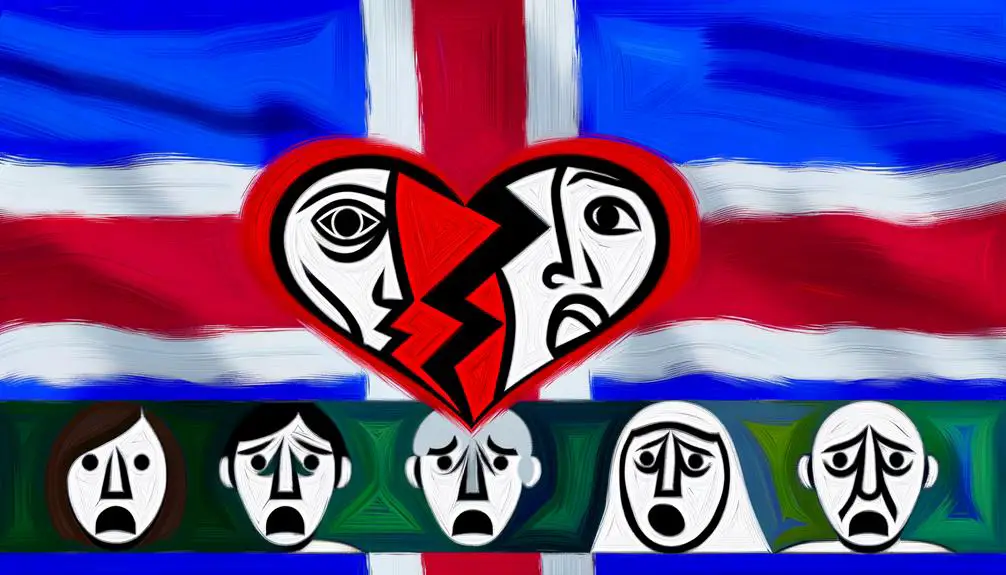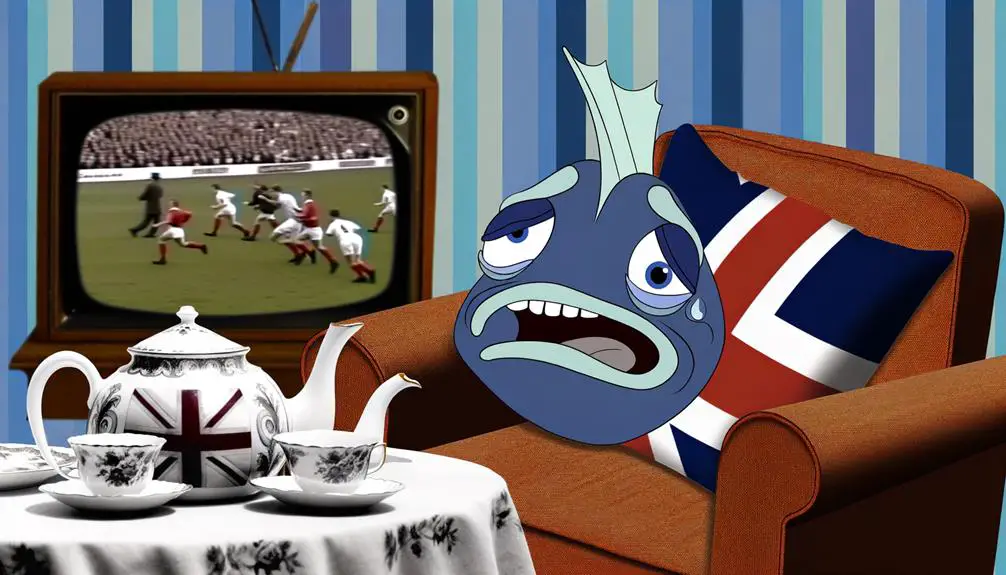When you hear someone in the UK say they're 'gutted,' they're expressing deep disappointment or despair, not discussing anything gruesome. This term is steeped in British culture, reflecting a broad spectrum of negative emotions, from missing a promotion to a heartbreaking sports loss. Its origins, tied to visceral imagery, have evolved from physical to emotional areas, mirroring societal changes and the fluidity of language. 'Gutted' conveys a weightier sentiment than mere disappointment, encapsulating moments of profound personal, social, or professional dismay. As you explore this term further, you'll uncover its nuanced role in expressing the intricacies of human emotions across various contexts.
Key Takeaways
- 'Gutted' is a British slang term expressing deep disappointment or despair.
- It reflects unmet expectations or significant losses in various contexts.
- Originating from a physical meaning, it has evolved to convey strong emotional reactions.
- Commonly used in situations like failing exams, breakups, or missing out on opportunities.
- Embedded in British culture, it illustrates profound sorrow with visceral imagery.
The Meaning of "Gutted"

In the rich tapestry of British slang, 'gutted' encapsulates a profound sense of disappointment or dismay, often experienced in personal, social, or professional contexts. Its versatility and emotional depth make it a staple in vernacular communication, reflecting a broad spectrum of negative feelings, from mild inconvenience to heart-wrenching loss. This linguistic phenomenon isn't static; it's part of an ongoing slang evolution, adapting to the changing landscapes of culture and society.
You might wonder about gutted alternatives that convey similar sentiments but with different nuances. Terms like 'devastated' or 'crushed' might spring to mind, each offering a different shade of meaning while contributing to the colorful mosaic of English slang. This evolution isn't arbitrary; it's driven by the collective experiences and creative expressions of the speakers, safeguarding the language remains as dynamic and vibrant as the culture it represents.
Understanding the usage of 'gutted' and its alternatives provides insight into the emotional resonance and flexibility of British slang. It's a proof of how language evolves to meet the expressive needs of its users, adapting over time to new influences and societal shifts. This ongoing linguistic adaptation safeguards that the emotional depth and cultural richness of expressions like 'gutted' are preserved, even as new alternatives emerge and the lexicon expands.
Origins of the Term
Delving into the origins of 'gutted,' you'll find it's deeply rooted in historical vernacular, reflecting a blend of cultural shifts and linguistic evolution over time. This etymology exploration reveals much about the term's journey, underscoring the complexity of linguistic progression. Initially, the literal act of removing the guts or internal organs, especially in a fishing or hunting context, the term evolved to embody a metaphorical sense of feeling emptied out emotionally.
- *The visceral imagery* of its literal meaning evokes a powerful emotional reaction, highlighting the depth of despair it now conveys.
- *Its evolvement from physical to emotional* reflects a fascinating linguistic evolution, where the tangible is used to describe the intangible.
- *The role of cultural shifts* in altering language showcases how societal changes influence linguistic adaptation.
- *The endurance of 'gutted'* through various eras underscores the adaptability and resilience of language.
- *Emotional resonance* with the term across different generations points to its effectiveness in capturing a universal feeling of profound disappointment.
Understanding 'gutted' through this analytical lens enhances our appreciation for the rich tapestry of language and its ability to evolve alongside human experience.
How "Gutted" Is Used

You'll find that 'gutted' is frequently employed across various contexts in British slang, serving as a poignant expression of deep disappointment or despair. When examining its usage, it's essential to understand the gutted pronunciation, which typically mirrors its spelling but with a pronounced emphasis on the 't' sound, distinguishing it from its more literal counterpart. This subtle nuance in pronunciation can convey a range of emotions, from a slight annoyance to profound sorrow, highlighting the term's versatility within the English lexicon.
The evolution of slang, including terms like 'gutted', underscores the dynamic nature of language, reflecting societal changes and cultural shifts. As slang evolves, 'gutted' has remained a staple in British vernacular, illustrating its ability to adapt and maintain relevance. Its usage extends beyond personal disappointment to encompass broader societal or communal setbacks, making it a term that resonates on multiple levels.
Analyzing its application, 'gutted' serves not only as an indicator of individual emotion but also as a mirror to the cultural context from which it springs. This adaptation and persistence in language usage demonstrate the term's significance within British slang, marking it as a poignant descriptor of the human condition.
Variations in Use Across the UK
How does the usage of 'gutted' vary across the diverse regions of the UK, reflecting the unique cultural nuances of each area? The term, deeply ingrained in British vernacular, showcases its flexibility and adaptability through regional dialects and accent influences. As you traverse the UK, you'll notice how the pronunciation and even the context in which 'gutted' is used can shift, painting a rich tapestry of linguistic diversity.
- In Scotland, the rolling 'r's and softer 't's lend a unique melody to 'gutted,' often emphasizing the disappointment in a more profound, soulful manner.
- Welsh speakers might imbue the term with a lyrical quality, reflective of the musicality inherent in the Welsh accent, making the expression of disappointment almost poetic.
- In the bustling cities of Northern England, 'gutted' is spat out with a sharper edge, mirroring the straightforward, no-nonsense attitude of its inhabitants.
- The South West's slower, drawn-out delivery of 'gutted' can add an almost reflective quality to the term, as if pondering the depths of the disappointment.
- London's diverse linguistic landscape sees 'gutted' morphing with the multicultural influences, showcasing how migration and cultural fusion shape language in real-time.
This regional variation not only highlights the complexity of British slang but also how regional dialects and accent influences enrich the language, offering a window into the cultural identity of each area.
Emotional Impact of "Gutted"

When you say you're "gutted" in the UK, you're conveying a level of deep disappointment and profound sorrow that goes beyond mere sadness. This term encapsulates a visceral reaction to events, reflecting a cultural tendency to use bodily metaphors to express emotional states. Understanding its usage offers insights into the ways Brits navigate and articulate complex feelings.
Deep Disappointment Significance
Although the term 'gutted' might seem casual, it encapsulates a profound sense of deep disappointment, reflecting a significant emotional impact on the individual. This expression, deeply embedded in British culture, often surfaces in contexts where the emotional stakes are conspicuously high, such as sports reactions or scenarios prone to cultural misunderstandings. Its usage underscores not just a momentary feeling of loss but a deeper, more visceral reaction to unmet expectations or dreams dashed.
- *The sinking feeling after a lost football match, despite fervent hopes of victory.*
- *The realization of a missed opportunity that seemed within reach.*
- *The shock and disbelief following unexpected bad news.*
- *The hollow emptiness after an anticipated event falls through.*
- *The personal regret over actions that led to an undesirable outcome.*
Expressing Profound Sorrow
Utilizing the term 'gutted' to express profound sorrow reveals a cultural depth, illustrating how deeply interwoven emotions are within the fabric of British lexicon. This term, stark in its visual imagery, juxtaposes sharply with the often more lighthearted or understated emotional indicators found in British communication. Unlike joyful expressions that sprinkle the everyday language with a sense of merriment, 'gutted' plunges into the heart of despair, serving as a cultural confirmation for experiences of profound loss or disappointment. It's a confirmation to the nuanced spectrum of human emotions that the British lexicon accommodates, allowing for a rich, albeit technical, exploration of feelings that range from the peaks of joy to the depths of sorrow.
Common Situations for "Gutted"
Numerous situations can evoke the use of the term 'gutted', a quintessential British slang, reflecting a profound sense of disappointment or despair. This expression, deeply embedded in British culture, serves as a vehicle for conveying intense emotional responses in various contexts. Its usage spans from personal experiences to collective sentiments, particularly in scenarios where expectations are dashed, leading to a visceral reaction akin to being hollowed out.
- Missing out on a promotion at work: Despite all your hard work and anticipation, the news that the promotion went to someone else leaves you feeling completely gutted.
- Failing an important exam: After months of preparation, not achieving the required marks can be a gut-wrenching experience.
- Relationship breakups: The end of a significant relationship, especially when unexpected, can lead to a profound sensation of being gutted.
- Sports disappointments: This encompasses both personal and collective experiences. For athletes, falling short of victory in pivotal moments, despite exhaustive preparation, can be devastating. For fans, their team's loss in a critical match, especially when victory seemed assured, can shatter celebration contexts.
- Cancelled plans or events: The anticipation of something eagerly looked forward to, like a holiday or a concert, being cancelled last minute can evoke a strong feeling of being gutted.
In these scenarios, 'gutted' transcends mere disappointment, touching on a deeper emotional resonance that is both personal and culturally significant.
"Gutted" in Popular Culture

Building on the varied contexts in which 'gutted' expresses deep disappointment, its presence in popular culture further illustrates the term's rich emotional and cultural dimensions. This British slang has transcended local vernacular to become a staple in global discussions, particularly through gutted memes and celebrity reactions that capture moments of profound letdown or disbelief.
Gutted memes serve as a digital canvas for expressing shared disappointments, often humorously encapsulating the feeling of being deeply disheartened. These memes cleverly use imagery and text to convey the depth of gut-wrenching emotions associated with personal setbacks or widespread societal issues, making the sentiment universally relatable.
Celebrity reactions employing 'gutted' offer a glimpse into the genuine human emotions behind public figures. When celebrities articulate their feelings of being gutted, it not only validates the term's emotional weight but also bridges the gap between their world and ours. Their candid use of 'gutted' in interviews, social media posts, and even on live TV showcases the term's versatility and reinforces its relevance in contemporary discourse, further embedding it into the fabric of popular culture.
Learning to Use "Gutted" Correctly
Understanding the correct usage of 'gutted' requires an analysis of its definition, common contexts in which it's employed, and the emotional nuances it conveys. You'll find that mastering its application not only enriches your vocabulary but also deepens your appreciation for the subtleties of British cultural expression. This exploration will equip you with the knowledge to use 'gutted' accurately in conversation, reflecting both its linguistic and emotional depth.
Definition of 'Gutted'
In the context of British slang, 'gutted' conveys a profound sense of disappointment or devastation, often used to express personal feelings in response to unfavorable outcomes. The literal interpretation and etymology debate surrounding 'gutted' enrich its usage, providing a deeper cultural understanding. This term's visceral imagery connects to the notion of having one's insides removed, mirroring the emptiness felt during moments of acute disappointment.
- *The sinking feeling when your favorite team loses at the last minute*
- *Realization of a missed opportunity that won't come again*
- *The hollow emptiness after receiving bad news*
- *The moment of shock upon learning something valuable is irretrievably lost*
- *Facing the aftermath of a mistake that cannot be undone*
Analyzing 'gutted' reveals its capacity to encapsulate complex emotional states, making it a powerful expression within the tapestry of British slang.
Common Usage Examples
To truly grasp the essence of 'gutted,' it's critical to examine real-life scenarios where this term aptly encapsulates the depth of someone's disappointment. Imagine you've been working tirelessly on a project, pouring your heart and soul into it, only to find out it's been abruptly cancelled. Your gutted reaction is profound, a mix of disbelief and profound sorrow, perfectly embodying the term's emotional weight. The slang evolution of 'gutted' from its literal meaning to a figurative expression of deep disappointment highlights its cultural significance. It's not just a word but a reflection of the impact of certain events on an individual's emotional state. Learning to use 'gutted' correctly involves understanding this nuanced emotional landscape, where the term serves as a bridge between mere words and a rich tapestry of human feelings.
Emotional Context Explained
Grasping the emotional context of 'gutted' requires delving into its cultural resonance, where it acts as a vivid descriptor for profound disappointment. This term, pivotal in the slang evolution, encapsulates a depth of feeling that transcends mere sadness. It's reflective of a moment where hope is eclipsed by an overwhelming sense of loss. Understanding its cultural significance aids in appreciating the nuance it brings to conversations.
- Feeling as if one's hopes have been eviscerated
- The shock of an unexpected negative outcome
- A visceral reaction to deeply personal setbacks
- The hollowness following a missed opportunity
- Emotional devastation akin to a physical blow
Analyzing 'gutted' in this manner illuminates its role in expressing complex emotional landscapes, highlighting its importance beyond casual slang.







